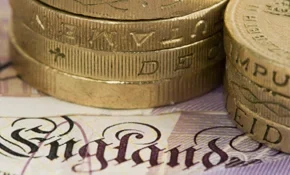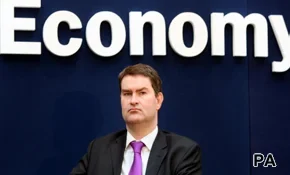Is paying tradespeople ‘cash-in-hand’ morally wrong?
This was the very question Treasury Minister David Gauke raised when he recently attempted to expand the debate around tax avoidance, by looking at cash-in-hand as another side of the 'aggressive' tax avoidance coin.
Mr Gauke, in an interview with the Daily Telegraph, was expressing growing concern in Whitehall about the cash-in-hand economy, which the Treasury estimates costs the UK anywhere from £2 billion to £8 a year in lost tax revenues.
While the minister received some criticism for his comments, on the charge that he was being “unnecessarily moralistic” and should instead focus on large-scale tax avoiders, it gave us a sure talking point in PoliticsLab.
We asked:
Do you agree or disagree with Mr Gauke’s view, that paying a tradesperson cash-in-hand is 'morally wrong', if done to help them avoid paying tax?
And most of you taking part in the discussion disagreed that paying tradespeople cash-in-hand is morally wrong.
- Many participants said that the government should focus on clamping down on big tax avoiders, like corporations, wealthy celebrities, and expenses-fiddling MPs, instead of excoriating ordinary people trying to keep their household expenses down.
- Others said that any perceived ‘moral dilemma’ around cash-in-hand payments, and the potential for avoiding paying tax, did not lie with them as consumers but with the tradesperson, who holds the responsibility for declaring any in-cash income they receive.
A smaller proportion of participants said they agreed with Gauke that paying cash-in-hand to avoid taxes is morally wrong.
- Those who agreed with Mr Gauke said that paying tradespeople cash-in-hand, to avoid paying tax, is morally wrong because it means the tax burden falls disproportionately on those who do.
- Others argued it was important for everyone to contribute to public services by paying taxes, and said you felt consumers and tradespeople who trade cash-in-hand are skirting their responsibilities to society.
- Participants in both groups pointed out that often paying in cash is the only option, as tradespeople don’t usually carry card machines, while many consumers don’t have cheque books, and therefore the responsibility to declare income falls to the tradesperson in the end.
Click on the headings below to read the range of comments made in Labs on the topic.
VIEWPOINT: 'Paying tradespeople cash-in-hand in order to avoid paying taxes is NOT morally wrong'
“Whilst we have all the highly paid tax avoiders working in Government and luvvies like Jimmy Carr on the make, I think it's a bit rich to start pontificating about plumbers, builders and the like” Jimmy C, London
“It is not the customer's responsibility to be the moral guardian of tradespeople, nor responsible for ensuring they pay their tax. A commercial deal between a tradesperson and customer is just that – a commercial deal, nothing more. I also object strongly to a Treasury minister coming out with a statement like this. Given the recent track record of quite a lot of MPs they have a cheek doing any finger wagging at anyone” John V, Hertfordshire

“The government should focus on tax evasion/avoidance by multi-national companies and the wealthiest individuals. Singling out small business people who work hard for their money in physically demanding roles should not be highlighted in this way” Anon
“The responsibility for paying tax lies with the tradesman/woman and not with the customer. I have been paying Vodafone regularly and it turns out they do not pay their taxes [according to reports Vodafone paid zero corporate tax in the UK this year]” Anon
“Legally wrong, but morally? That's a different question. You could argue that the amount of tax that the government already takes is morally wrong. How they spend it is also morally wrong. And for any politician to lecture us on morals (after the expenses scandal which was whitewashed away) is wrong on all counts, not just morals!” H, Aberdeen
“The government fleece us and it’s hard to save money at the end of the month. So saving 20% on a bill is all we can do to save a little of the cost of living” Harvey, Suffolk
“What is ‘morally wrong’ are the tax breaks being given to official Olympic sponsors and the Treasury writing off billions of pounds in tax owed by large corporations” Anon
“Most tradesmen don't evade tax but declare it, unlike politicians who not only embezzle the Exchequer with fake expenses but employ Jimmy Carr-style known tax avoidance tricks” Nick, Farnham
VIEWPOINT: 'Paying tradespeople cash-in-hand in order to avoid paying taxes IS morally wrong'
“Everyone should pay their fair share of tax, otherwise those who do subsidise those who don't and the country has less to spend on services” Anon
“In a way it is ‘stealing’ from the nation. If the majority of businesspeople did this the country would be bankrupt” Babs, Newcastle upon Tyne
“You are making yourself an accessory to a crime. It's no different from buying a TV from a man in the pub who you suspect stole it” Anon
“It's wrong because legally they are required to pay tax, and you know when they offer a lower rate for cash that the intention is to avoid paying. It's incredibly tempting of course, and most people do it” Anon

“If a lot of 'cash-in-hand' payments are made to avoid paying tax then government income for benefits and bail-outs is reduced and that money has to be recovered by putting the tax percentages up in other areas, e.g. VAT and income tax, further depleting those who are honest with tax matters” Anon
“The law is that tax has to be paid on income. Whilst it is the responsibility of the trader to pay tax, paying cash with the intention that tax may be avoided is complicit in law-breaking. Tax is the price we pay for the benefits we gain from society. If we believe that rates of tax are too high, or that tax is not spent to the best purpose, it is through democratic, means that we should seek change, not through breaking the law” Anon
“There's no moral difference between this kind of small-scale avoidance and the sort of corporate avoidance that goes on. If we are citizens, we pay our dues and get the benefits. Simple as that” Anon

Do you think paying a tradesperson cash-in-hand, in order to avoid paying taxes, is morally wrong?
In a wider sense, do you think progress is being made on clamping down on tax avoidance?







